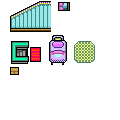Hi guys! I am still a NEWBIE when it comes to pixel art! today was practicing a bit with pixel art style but... SHOULD SOMETHING LIKE THIS WORK for an ACTUAL GAME?


WHICH dimesions/ settings should I follow if I want to create USABLE ASSETS on future? sorry for my COMPLETE IGNORANCE!! and really ty for your help!!

